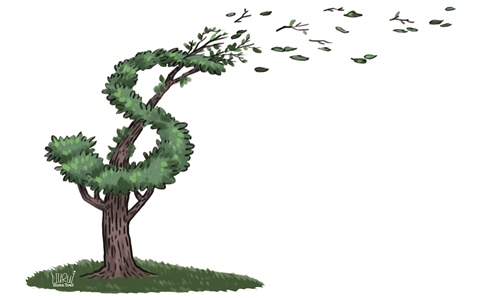Why China recalls 'protracted war' history

Aerial photo taken on June 10, 2020 shows a reaper harvesting wheat in a field in Mahui Village of Datong Town in Wu'an City, north China's Hebei Province. Photo: Xinhua
The Political Bureau of the Communist Party of China (CPC) Central Committee clearly pointed out that "since many problems we face are long- and medium-term, resolving such problems is like fighting a protracted war," during a meeting held on Thursday.
It has been 82 years since Mao Zedong wrote On Protracted War in June 1938. At that time, China was at its worst time during the War of Resistance against Japanese Aggression (1931-45) and almost subjugated by Japan.
It is sorry to see the international media focus on only what US President Donald Trump says and overlook the voices of China's decision-makers.
When Mao started writing On Protracted War, it had been 10 months since Japan launched an all-round war of aggression against China. There were two dominant arguments: "China's inevitable subjugation" and "China's quick victory."
Mao systematically summed up the experience of the early stage of the war of resistance and comprehensively expounded China's strategic confidence in winning the war by means of protracted war.
In its thousands of years' history, the Chinese nation had a long period of depression and China almost fell to its lowest point in history when Mao started writing On Protracted War.
Therefore, when Mao proclaimed the establishment of the Central People's Government of the People's Republic of China in 1949, it has not only the "centennial significance" of getting rid of humiliation since 1840 for the country, but also the "millennium significance" of reversing the national decline.
However, it is inevitable that there are twists and turns in the exploration of national rejuvenation. After the turmoil wrought by the Cultural Revolution (1966-76), China's economy was on the verge of collapse. But China has risen again in crisis and the great rejuvenation of the Chinese nation has been accelerating particularly due to the reform and opening-up in the past four decades.
Nevertheless, it is not the time for the Chinese people to be complacent about China's achievements. Nor should Chinese stop moving forward. In the current fierce international competition, a country will fall behind if it doesn't strive to develop. It will be a test of the sustainability of China's development and the CPC's leadership. This is why the decision-makers have recalled the "protracted war" history.
Under circumstances of profound changes unseen in a century, China's decision-makers hope to use the phrase of "protracted war" again to remind the country's officials and ordinary people that they should not belittle their achievements and that they should avoid arrogance and rashness at the same time.
Just like the two theories of "China's inevitable subjugation" and "China's quick victory" that proved themselves wrong during the War of Resistance against Japanese Aggression, the current theories of "China's failure" and "China's successful rise" are also unacceptable.
The whole world is concerned about the China-US relations as well as China's future, especially at a time when the Trump administration has been aggressive and keeps provoking China. By contrast, China is more patient and peaceful when dealing with the US. The game is like a soccer match between two well-trained teams where the winner is the one who paces instead of rushes ahead to obtain victory. But actually, the China-US game is more like a marathon with no finishing line in sight.
People familiar with China's history know that the Chinese people have been seeking the road of national rejuvenation from generation to generation since their first ever defeat by Westerners in the Opium War in 1840. Today's China is closer to the goal of realizing the great rejuvenation of the Chinese nation than any time in history. But it is still too early to talk about China's real rise and success.
Chinese President Xi Jinping once said that each generation has its own "long march" and they should proceed in their own way, noting that the "long march" today is to realize the Chinese dream of national rejuvenation. From this perspective, China regards itself rather than the US as its rival.
Trump's role is only to remind the Chinese once again that the rise of China is a new "long march" in which every Chinese plays a leading role and shoulders the responsibility of the era. Chinese people must continue to preserve the practice of hard work, abandon arrogance and impetuosity, and maintain a spirit that nurtures this notion: Time and tide wait for no man, and one should make the best of every minute.
The author is professor and executive dean of Chongyang Institute for Financial Studies at Renmin University of China and executive director of China-US People-to-People Exchange Research Center. opinion@globaltimes.com.cn


